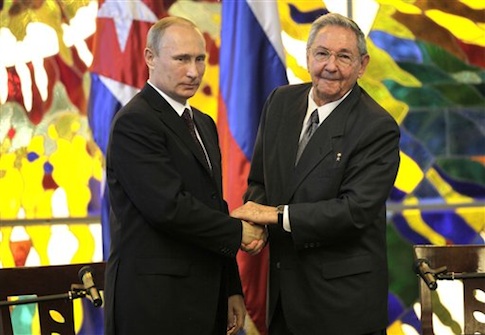Russia has reached an agreement with Cuba to reopen what was previously one of its largest foreign intelligence bases, according to reports.
Kremlin propaganda outlet RT cites reports that Russian President Vladimir Putin cemented the deal to resume operations at the intelligence facility in Lourdes, Cuba, after meeting last week with Cuban President Raul Castro in Havana. The facility played a role in the Cold War:
The facility in Lourdes, a suburb of Havana located just 250km from continental USA, was opened in 1967. At the peak of the cold war it was the largest signal intelligence center Moscow operated in a foreign nation, with 3,000 personnel manning it.
From the base Russia could intercept communications in most part of the US including the classified exchanges between space facilities in Florida and American spacecraft. Raoul Castro, then-Defense Minister of Cuba, bragged in 1993 that Russia received 75 percent of signal intelligence on America through Lourdes, with was probably an overstatement, but not by a large amount.
The Kremlin closed the base in 2001 after U.S lawmakers threatened to not forgive any Russian debt unless the facility was shut down.
Details about the base’s new operations remain sparse:
No detail of schedule for the reopening the facility, which currently hosts a branch of Cuba’s University of Information Science, was immediately available. One of the principle news during Putin’s visit to Havana was Moscow’s writing off of the majority of the old Cuban debt to Russia. The facility is expected to require fewer personnel than it used to, because modern surveillance equipment can do many functions now automatically.
With the Lourdes facility operational again, Russia would have a much better signal intelligence capability in the western hemisphere.
Putin has been quietly expanding Russia’s influence in Latin America as the United States disengages from the region, critics say.
